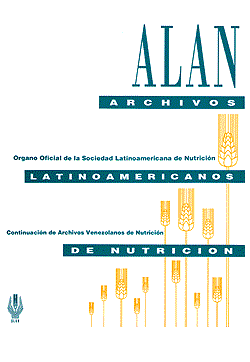Diet and risk of mental illness in Peruvian adults, cross-sectional study
DOI:
https://doi.org/10.37527/2021.71.3.004Keywords:
Ingesta Dietética, Enfermedad Mental, Riesgo, Adultos, Perú, Dietary Intake, Mental Illness, Risk, Adults, PeruAbstract
Introduction. Mental illnesses represent one of the biggest public health problems. Consuming foods rich in antioxidants such as fruits and vegetables can lower risk factors. Objective. To analyze the dietary intake and the risk of mental illnesses in Peruvian adults. Materials and methods. A cross-sectional study was carried out in 393 Peruvian adults, who came from the three regions of the country (coast, mountains and jungle). Sociodemographic and anthropometric data were obtained through a registration form and the risk of mental illnesses was determined using the General Health Questionnaire-12 (GHQ-12). The data were analyzed using the statistical software IBM SPSS, version 26. The Chi-square test was used, considering a significance level of 5%. Results. Participants who reported risk and presence of mental illness reported inadequate consumption of fruits, vegetables, and healthy fats. Adequate consumption of whole grains, fruits and vegetables was significantly higher in women (p <0.05). However, more than half of the women proved to be at risk for mental illnesses compared to men (p <0.001). Conclusions. The adequate intake of healthy foods could be beneficial in reducing the risks of mental illness in this population group.
Downloads
Published
How to Cite
Issue
Section
License
Copyright (c) 2022 Delia E. Banda-Ccana, Veronica H. Infantes-Ruiz, Yaquelin E. Calizaya-Milla, Jacksaint Saintila

This work is licensed under a Creative Commons Attribution-NonCommercial 4.0 International License.
Usted es libre de:
Compartir — copiar y redistribuir el material en cualquier medio o formato
Adaptar — remezclar, transformar y construir a partir del material
La licenciante no puede revocar estas libertades en tanto usted siga los términos de la licencia
Bajo los siguientes términos:
Atribución — Usted debe dar crédito de manera adecuada, brindar un enlace a la licencia, e indicar si se han realizado cambios. Puede hacerlo en cualquier forma razonable, pero no de forma tal que sugiera que usted o su uso tienen el apoyo de la licenciante.
NoComercial — Usted no puede hacer uso del material con propósitos comerciales.
No hay restricciones adicionales — No puede aplicar términos legales ni medidas tecnológicas que restrinjan legalmente a otras a hacer cualquier uso permitido por la licencia.


